It was eight years ago this month that Dundalk reached their zenith as a football club.
Ciaran Kilduff side-footed home from a Daryl Horgan cross to score the only goal against Maccabi Tel Aviv and Dundalk became the first and so far only League of Ireland team to win a game in the group stages of European competition.
A month beforehand, they had beaten BATE Borisov 3-0 on a rain-sodden evening in Tallaght, with long-standing supporters dissolving into tears of joy in the stands.
The win over Borisov took them to within one round of the Champions League group stage - the ultimate gated-off dream world - a feat which matched the expensively assembled Shelbourne side of 2004, which shocked Hadjuk Split before taking on Deportivo La Coruna in the final playoff round.
Two years after that game, Shels would meet their own financial armageddon, the debts accrued in chasing the European dream catching up with Ollie Byrne and his beloved club.
While Dundalk fell honourably short against Legia Warsaw - mustering a 1-1 draw in the away leg - they still had the exceptional fall-back of the Europa League group phase, already pocketed courtesy of the Borisov win.
Reaching the group phase was trippy enough, now it appeared a live prospect that they could go one further and reach the knockout phase altogether.
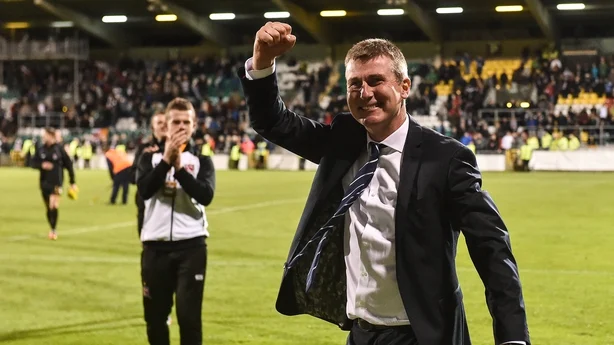
It was an astonishing turnaround for a club which four years earlier had been in danger of going to the wall. Owner and CEO Gerry Matthews, who bought Dundalk from a supporters co-op in the mid-2000s, announced that he was no longer in a position to put money into the club and sought expressions of interest.
Players wages went unpaid, results deteriorated, crowds fell precipitously. A supporters' trust was established to urgently raise money. "I think we may have been a couple of days from going out of business," former general manager Martin Connolly told the Irish Times in 2016.
With no league win between 21 May and 26 October, they shipped a 7-0 thrashing in Tallaght and a 4-0 beating at the Brandywell as the season wound down. Of the teams that saw out the 2012 Premier Division season, Dundalk finished last. They were only spared automatic relegation due to Monaghan's withdrawal from the league mid-campaign.
They shouldn't have seemed a daunting opponent in any promotion-relegation playoff, but Michael Rafter's brace of goals in the RSC saw them beat Waterford 2-0 in the second leg and 4-2 on aggregate. Connolly subsequently told the Irish Times that he believed it would have been "curtains" for the club had they lost that tie.
By this stage, local business owners, Andy Connolly and Paul Brown of Fastfix - a nuts and bolts shop in Dundalk - had stepped in to rescue the club and clear its debts totalling €192,000.
A month or so after the season ended, they met Stephen Kenny at his home in Donegal - the Tallaght man then at a loose end and at a low ebb in his career after an unhappy spell in charge at Shamrock Rovers.
A deal was done and Kenny was soon to work the kind of immediate wizardry previously witnessed at Longford Town and Derry City. The 2010s, which began with the club in serious financial strife, was improbably to become the greatest decade in their history.
Already the most successful provincial club in Irish football by a distance, Dundalk were to enjoy a period of unprecedented success, winning five league titles in six years, including two doubles and the famous European run of 2016.
By 2016, the fairy-tale at Dundalk was attracting interest from international publications and their manager was being touted as a possible Republic of Ireland boss - an unthinkable notion for a League of Ireland gaffer in the couple of decades prior to that.
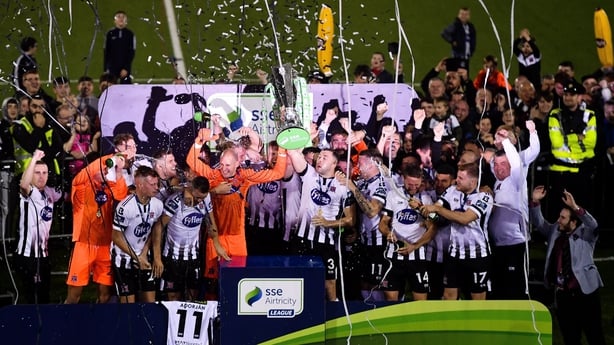
International investors had their heads turned. In early 2018, Chicago-based investment firm Peak6 bought the club, declaring that their intention was to make Dundalk the "dominant club" in Ireland and making further inroads in European competition.
The firm, founded in 1997 by Matt Hulsizer and Jenny Just, owned a 25% stake in both Bournemouth and Roma, and drafted in ex-Derby County and Sheffield United CEO Malachy Brannigan as chief executive.
Having lost the league to a Seanie Maguire-inspired Cork City in 2017, Dundalk won another double in Peak6's first year of ownership.
However, change was afoot. Kenny departed to take over the Republic of Ireland U21s with a view to succeeding as senior international manager after Euro 2020.
Under Kenny's assistant and successor Vinny Perth, Dundalk won their last league title in 2019, easing to the title by 11 points after a faltering start. They hadn't, however, been able to replicate the European success of 2016, and there was upheaval behind the scenes.
The experienced Brannigan had departed at the end of the 2018 season to take a role with Sheffield United, while the club's fresh-faced American chairman Mike Treacy left in late 2019, to be succeeded by the Peak6 owner's father Bill Hulsizer.
The bearded septuagenarian Mr Hulsizer followed in the grand tradition of the eccentric American owner and wasn't shy about advancing his novel ideas about the game. Most memorably, he proposed that goalkeeper Gary Rogers should take the corners as he was the best kicker of the ball. The centre-half Brian Gartland, he said, should take all the throw-ins due to his basketball background.
He also sought to have a phone line installed in the dugout so he could communicate his ideas with Perth mid-game.
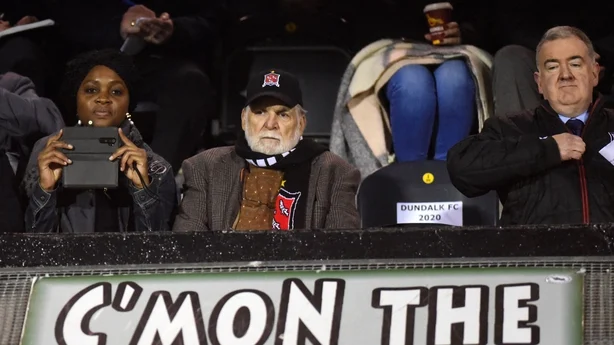
Ahead of one league game in 2020, he submitted a potential XI for Perth to consider which included 11 outfield players and no goalkeeper - an episode reminiscent of Todd Boehly's revolutionary 4-4-3 formation at Chelsea which Thomas Tuchel refused to enact.
By the time of the Covid interruption, the era of Dundalk's supremacy in Irish football was drawing to a close.
While they won four from five prior to the initial lockdown, losing only the top-of-the-table clash to Shamrock Rovers, they returned to action in July in poor form. After failing to win the first three league games on the resumption and a heavy 3-0 Champions League loss to Slovenian side NK Celje (the side recently humbled by Shamrock Rovers at Tallaght Stadium), Perth was promptly sacked.
Robbie Keane's name was initially mentioned in connection with the role, though this talk quickly fizzled out.
On 24 August 2020, Italian coach Filippo Giovagnoli was unveiled as the new Dundalk manager to much bemusement. To call this appointment leftfield would be to severely understate its wackiness.
A former Serie C defender, Mr Giovagnoli's previous experience consisted of being technical director of AC Milan's junior camps and as director of coaching of the Metropolitan Oval Academy in New York.
Giovagnoli did not have the required UEFA qualifications, necessitating the appointment of Shane Keegan as head coach. Indeed, Keegan was officially listed as manager during the improbable Europa League group stage run, as the Italian numero uno was not technically allowed on the touchline. Giovagnoli, for his part, was reported as having described his Dundalk posting as a "kamikaze mission."
While the league was now out of reach for Dundalk - Shamrock Rovers streaked away to win the truncated season unbeaten - they did secure another long European campaign at the end of 2020.
Aided by a slightly fortuitous draw, they defeat Moldova's Sheriff Tiraspol and Faroese side Ki to achieve European group stage for the football for the second time. Though their group this time offered up a glamorous outing against Arsenal, the absence of crowds made it a less memorable experience, as did Dundalk's failure to pick up any points.
Still, Giovagnoli had hardly disgraced himself despite his underwhelming credentials as Dundalk finished the league third and wound up denying Shamrock Rovers the double, winning the FAI Cup final 4-2 in an empty Aviva on a bitterly cold December Sunday.
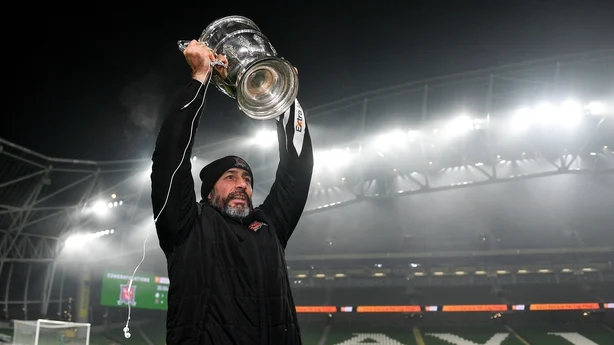
By now, however, the Hulsizers were souring on the league and rapidly losing faith in their investment. In October, from his lair in Chicago, Matt Hulsizer told David Sneyd in the Irish Independent that the bureaucracy of Irish football was grinding them down.
One bugbear was the FAI and the IRFU's failure to play ball on their idea of using the Aviva Stadium for 10 games a season. Ominously, he also asserted that Dundalk had a wage bill which was double that of any other League of Ireland team.
Despite the outlay on the playing side, Oriel Park remained in an impressively dilapidated state. During the glory years, the incongruity of the best team in the league playing out of one of its most ramshackle stadiums was often remarked upon. The lease to the ground is held by the Casey family trust - the family of the late Des Casey, former chairman and one-time FAI President - and Peak6 contended that their reluctance to invest was in the ground was due to the fact the club did not own the ground.
Coaches were arriving and departing with bewildering speed. Ex-Northern Ireland midfielder Jim Magilton was hired as sporting director in December 2020. A glut of players were signed over the winter, ranging from places like Latvia to the Faroe Islands to the Central African Republic to South Korea.
The club made a disastrous start to the 2021 season and Giovagnoli and Keegan were removed from their posts in April, with Magilton taking temporary charge for a couple of months.
Hulsizer Snr's opinions and antics had alienated the fanbase and they were banners calling for his ousting appearing at Oriel Park.
In June, Perth was re-hired 10 months after his sacking and Dundalk's position stabilised for the latter half of the season, rising out of relegation trouble and into sixth spot. In October, there was backroom upheaval as Magilton departed amid rumours of tension with Perth.
By November 2021, amid much relief in Dundalk, Peak6 removed themselves from the equation, the American investment firm agreeing a deal with former owner Andy Connolly - who had rescued the club in 2012 - and sports technology firm StatSport.
Having nabbed Stephen O'Donnell as manager from St Pat's in the off-season, Dundalk had an improved campaign on the pitch in 2022, even mounting a title challenge which eventually fizzled out in the closing weeks of the season.
However, there were warning signs on the financial front, with local journalist James Rogers reporting a dramatic fall in their cash in bank figure at the year ending 2022, down over €1 million on the previous year.
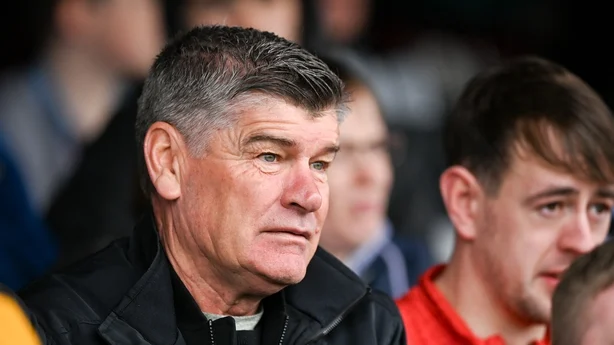
After an indifferent 2023 season, in which they finished fifth in the league and missed out on European football, the local consortium sold the club to ex-Kerry FC CEO Brian Ainscough, a former League of Ireland footballer who had emigrated to the USA in 1983.
Interim FAI CEO David Courell admitted this week that all financial checks had not been carried out on Ainscough due to a "loophole" relating to the timing of his takeover.
The licence for the 2024 league was granted in November 2023. Ainscough took over the club in December, meaning the financial checks only examined the previous ownership.
Cue a truly disastrous 2024 season, which has left Dundalk on its knees. The club, on their third manager in this campaign, sit bottom of the table.
Last week, with Ainscough struggling to find the promised new investors, and players and staff reporting unpaid wages - the combined payroll has been reported at €120,000 per month - the prospect of relegation to the First Division was the least of their worries.
In late 2012, at the end of a harrowing season, the then-debts of just over €190,000 were cleared by the incoming owners.
Less than 12 years later, after five league titles, three FAI Cups, and two runs in the Europa League group phase (earning a combined €11m), the debts are believed to be comfortably over a million.
But on Tuesday, Dundalk announced that Ainscough had agreed to a takeover by a consortium led by local barrister John Temple, which has agreed to pay the players' wages until the end of the season.
Dundalk aren't out of the woods yet. The new owners will "examine the viability of the club and its facilities going forward". But, for the moment at least, the League of Ireland's second-most successful club has dodged another bullet.
Disclaimer: The copyright of this article belongs to the original author. Reposting this article is solely for the purpose of information dissemination and does not constitute any investment advice. If there is any infringement, please contact us immediately. We will make corrections or deletions as necessary. Thank you.






